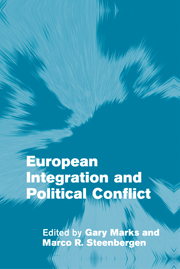Book contents
- Frontmatter
- Contents
- List of figures
- List of tables
- List of contributors
- Preface
- Introduction: Models of political conflict in the European Union
- Part I Citizens
- 1 The structure of citizen attitudes and the European political space
- 2 Potential for contestation on European matters at national elections in Europe
- 3 Don't rock the boat: expectations, fears, and opposition to EU-level policy-making
- 4 Varieties of capitalism and political divides over European integration
- Part II Political parties
- Part III Groups
- References
- Index
3 - Don't rock the boat: expectations, fears, and opposition to EU-level policy-making
Published online by Cambridge University Press: 22 September 2009
- Frontmatter
- Contents
- List of figures
- List of tables
- List of contributors
- Preface
- Introduction: Models of political conflict in the European Union
- Part I Citizens
- 1 The structure of citizen attitudes and the European political space
- 2 Potential for contestation on European matters at national elections in Europe
- 3 Don't rock the boat: expectations, fears, and opposition to EU-level policy-making
- 4 Varieties of capitalism and political divides over European integration
- Part II Political parties
- Part III Groups
- References
- Index
Summary
The proper extension of the power of the EU – the exact domains in which decisions should be taken at the European level rather than by national or subnational authorities – remains a contentious issue. While the existence of the EU is uncontested, the scope of EU authority is an element of political dispute. Some scholars have examined this new political question and tried to make sense of it as a novel political issue, weakly or not related to traditional ideas and ideologies. Public opinion research on the European electorate has found support for European integration to be organized along two separate dimensions, one left/right, the other pro-/anti-Europe (Hix 1999b; Gabel and Anderson, this volume). Other research on political parties has demonstrated that the issue of European integration fits into existing political cleavages and Weltanschauung. Marks, Wilson, and Ray find that support for the EU is related to traditional party families (2002). Hooghe, Marks, and Wilson (chapter 6, this volume) find a relationship with the “new politics” dimension. Data on the European Parliament also suggest the importance of the left/right dimension in structuring contestation within this eminently European body (Thomassen, Noury, and Voeten, chapter 7).
I argue that a new European dimension in the political landscape is neither unrelated (orthogonal) to the traditional ideologies which have structured European politics, nor coterminous with them. Instead, the relationship between ideology and support for EU decision-making varies systematically according to the expected impact of EU decision-making on policies voters hold dear.
- Type
- Chapter
- Information
- European Integration and Political Conflict , pp. 51 - 61Publisher: Cambridge University PressPrint publication year: 2004
- 30
- Cited by



